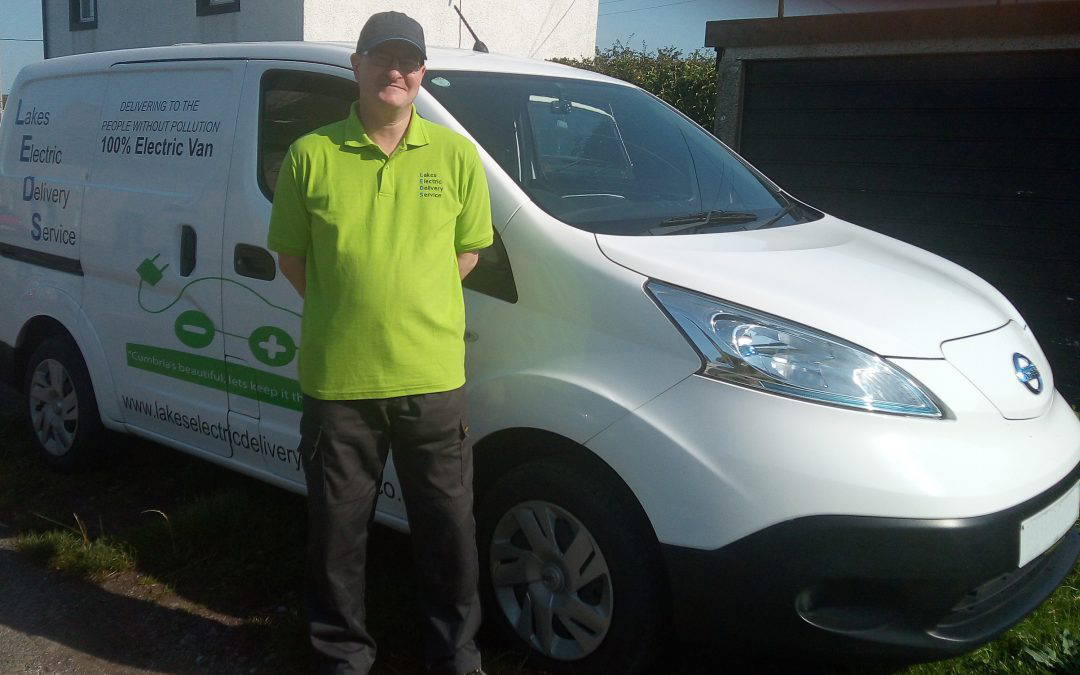Running a successful delivery service using an EV
“Not just ‘last mile’ delivery – my electric van does every mile of the delivery!”
As part of our ‘EVs in business’ series we interviewed Simon Brace, owner of Lakes Electric Delivery Service about his experience of using an electric vehicle.
Simon Brace, Lakes Electric Delivery Service
Tell us about your business and why you chose an electric vehicle?
I’d been a self-employed delivery driver since 1999 and was used to doing long-distance haulage with antiques. In 2015 I started getting fed up with the cost of fuel going up and the repairs on my aging van becoming more frequent. It was a repair bill of £1,200 coupled with becoming disheartened with the long distances that made me decide to rethink my business model.
This coincided with my wife’s job moving to a new office which had just had electric vehicle charge points installed, and her decision to buy an electric vehicle. We had basic knowledge about EVs, but our options at the time were very much limited to a Nissan Leaf or Renault Zoe. Taking into consideration our budget and her commute, we purchased one of the original 22kWh Zoe battery-owned models and we managed to get a good deal on it.
I still had my diesel van at the time, but I enjoyed driving the Zoe so much at weekends that I knew my next van had to be electric.
What electric vehicle did you choose?
Finding the right electric van for my business wasn’t easy. I liked the Nissan e-NV200, but it had only just come out and was expensive, so I put my plan on hold for 18 months until I found something more affordable.
In 2017 I bought my first electric van, a Peugeot Partner ex-demo, for a really good price. It was just under three years-old and had only done 2000 miles. It had a 22kWh battery, with an average range of between 72-75 miles, going up to 90 on a good day and down to about 65 in winter. Best range I ever got from a single charge was 114 miles. This vehicle really suited my needs as I had decided to stop the long-haul work and focus my business on deliveries around the Lake District.
But as my business grew, I needed a van with bigger capacity, both to hold more items and also to move bigger items.
What do you drive now and how does it compare to your first electric van?
I recently upgraded to a 22kWh Nissan e-NV200 which is a bigger vehicle. There are now more of them around compared to when I first looked at buying one, but although they have become more affordable, they still hold their value. I shopped around and found a low-mileage 3-year-old one for sale privately.
I find the e-NV is on the whole, better on the range for me than the Peugeot was. On average I get 80 miles range, at worst, 70, but on a good day I achieve well in excess of 90 miles.
What do your customers think about your choice of vehicle?
In 2018 the Lake District became a World Heritage Site and with this status came an increased awareness locally of the need to protect the Lakes and surrounding environment.
My customers think it’s excellent that I drive an EV and many choose me because of it. My customers are a 60/40 split between individuals and businesses, but I can see the amount of business customers growing as they take steps to become greener themselves.
Looking back, you must be really pleased that you invested early in moving to an EV?
Absolutely, and because we’d had the Zoe for 18-months I had no concerns about introducing an electric vehicle into my business. My fuel costs have reduced significantly. I now spend about a third of what I used to on diesel, or even less if any ‘free’ charges can be had at any point in the day.
I no longer pay any road tax, saving me £280 per year, and I’m also saving a lot of money on the high maintenance bills I used to pay to keep my old diesel running.
How many miles do you travel a day and what is your charging schedule?
Across the week I can travel close to a thousand miles. Yesterday I did 340 miles, and so-far today I have done 220. My round does take me longer than if I was driving a diesel, as on average I need to charge 2-3 times a day, but I can rapid charges in 15-20 minutes. I always take a lunch break and a couple of comfort breaks anyway.
Are there any downsides in driving an EV for business?
It’s certainly easier driving an EV now as the local charging network has improved, compared to a couple of years ago when my journeys took a lot more planning. But my business model isn’t about time-based delivery.
Over time I’m hoping that the cost of buying new electric vans will come down. Since the typical tradesperson usually wants a vehicle that can fit an 8x4ft sheet in, an affordable vehicle of this size would be very popular.
What advice would you give to someone considering using an EV for their business?
I get asked that question a lot, and I say, “Do the sums and then ask yourself why not?”
Yes, the initial investment can be high, but I’ve found that they hold their value well. Work out how much you would spend on fuel and road tax over the lifetime of your vehicle – and you will find savings.
I’d also challenge people to consider “How far do you really travel?” Tradespeople who mainly work locally to where they live may find that their average mileage isn’t actually that high. It’s the short distances in and out of town that create pollution – and these short distances just aren’t good for diesel engines. That’s why the related maintenance costs are so high compared to EVs.
With more cities and towns bringing in low and zero emission zones, delivery businesses and trades will need to start thinking about electric vehicles anyway. But look at the benefits, because in addition to the cost savings there is the opportunity to win business from environmentally conscious customers, if you promote your business the right way.
To learn more about Simon’s business visit: www.lakeselectricdeliveryservice.co.uk
To find out which electric vehicles would be suitable for your business, look on our EVs for sale page or book an appointment with one of our team: or 01242 308006
Disclaimer: While all reasonable care has been taken to ensure that information shared is correct, no liability is accepted by Cleevely Electric Vehicles for any loss or damage caused to any person relying on any statement or omission. This is for information only and should not be relied upon as offering advice for any set of circumstances. Information shared within our interviews are the opinions and experiences of that individual. Specific advice should always be sought in each instance.

